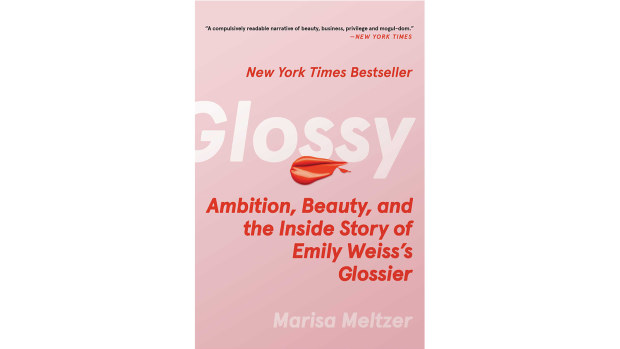“To me, the company and Emily read like a thriller,” she says. “Even if you were a fan of the company, you might not have followed all the various dramas and controversy in the business. Additionally, she acknowledges: “There were plenty of people who didn’t know who Emily Weiss was. And I wanted people who would buy books about business and finance to buy it. The idea was to piece it all together. The company is not forthcoming, so people are dying for inside information.”
Meltzer interviewed more than 200 insiders, from former employees to Instagram fashion partnerships head Eva Chen, who was Weiss’ boss at Teen Vogue. Weiss herself declined to be interviewed; Meltzer says her reticence to open up the way other female founders do was part of her desire to be treated “like a male founder”.
“I think for many women there is both a feminine urge to share, and an internalised misogyny that we have to share,” says Meltzer. “I remember asking [Weiss] about freezing her eggs and she recoiled and said that nobody would ask a male founder that question.” Meltzer disagrees. “I don’t think that’s necessarily true, we ask private questions of Elon Musk and Jeff Bezos. But I understood the need to be taken seriously.”
In fact, this desire to be taken seriously is parallel to the way Meltzer feels about the beauty industry in general.
“Weiss was the head of a company that sold beauty products. It’s a huge, valuable industry, but it’s not always seen that way.”
Weiss, Meltzer says, was perhaps “overcorrecting for that”.
“Weiss was funding the company through venture capital, so she was in the room with mainly men who would say they wanted to take the samples home for their wives or daughters. She is dealing with a lot of gendered frustration, and I think mainly she wanted to be taken seriously.” It’s ironic, then (though not surprising) that Weiss refused to do her own beauty shelf tour for The New York Times, despite this being her stock-in-trade at Into the Gloss.
Through Meltzer’s forensic lens, Weiss is revealed as a deeply ambitious leader, the kind of person who does nothing accidentally. That she came through the ranks with other “girlbosses” of the time is almost more of a coincidence than anything else in Meltzer’s narrative. Weiss deliberately defined herself differently (though Glossier did host team-building exercises such as Camp Glossier, a very #girlboss thing to do). Still, for all the founder’s single-mindedness and devotion to her company, she lacked the business insight to scale it sustainably. Weiss might have built the house, but she couldn’t run it.
Meltzer’s book is also a paean to the long-overlooked beauty industry. Despite fashion brands using beauty as an entry product for customers and the global beauty industry being worth more than $US530 billion ($834 billion), it has been seen as frivolous and niche. Meltzer rejects this.
“When I was working in women’s magazines, the beauty editor was often the highest compensated and most valuable because they had such a direct relationship with advertisers who went to great lengths to get their attention,” says Meltzer. “The idea that beauty is less important than fashion is just incorrect. But it’s happened because fashion has always been more tied to artistry. So many designers have been men, traditionally, even if they designed for women. And so it’s been overlooked.”
Though Meltzer wasn’t able to uncover exactly why Weiss stepped down, she estimates that she still owns about 20 per cent of the company. As for what’s next, Meltzer wonders how Glossier can retain its edge when it’s now sold in Sephora in the US and Canada (something it resisted for years) and ships worldwide.
“I will be very interested in how markets like Italy and Australia react to Glossier,” says Meltzer. “The brand has a lot of mystique – which has faded somewhat – but it’s not a luxury product like Augustinus Bader with advanced scientific properties. It is, ultimately, a good iteration of moisturiser and cleanser. It’s not cutting edge.”
However, she adds, doing well in a market such as Australia, and expanding into Asia, could make the company ripe for acquisition. “Look at Aesop,” says Meltzer. “It succeeded in so many different territories, and because it could be many things to many people, it got a huge payday.”
Glossier might have missed the mark for its own payday – the DTC beauty boom is probably over after companies such as Charlotte Tilbury and Drunk Elephant were sold to conglomerates – but it’s still a significant company. So far, it’s raised more than $US260 million in VC funding and is worth $US1.8 billion. And it’s still making headlines, such as when it was announced that the brand would begin shipping to Australia.
Meltzer doesn’t know whether Weiss has read the book. “If someone had written a book about me, I wouldn’t be able to resist reading it,” she says, laughing. “But Emily has fierce boundaries. I can totally see her looking at it and putting it away, never reading it. That would be very on-brand.”
Glossy: Ambition, Beauty and the Inside Story of Emily Weiss’s Glossier by Marisa Meltzer (Atria/One Signal).
